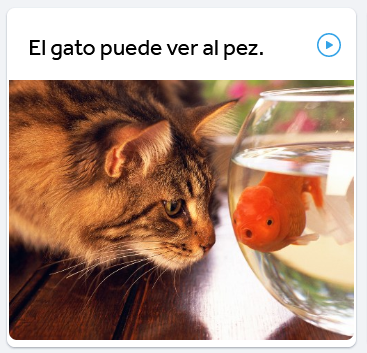Ask a Question(Create a thread) |
|
|||||||
Why is the "a" used here?This is the place for questions about conjugations, verb tenses, adverbs, adjectives, word order, syntax and other grammar questions for English or Spanish. |
 |
|
|
Thread Tools | Display Modes |
|
#1
|
|||
|
|||
|
Why is the "a" used here?
I have the following:
 I'm pretty sure - based on the other examples in this part of the lesson - that they are saying "the cat can see the fish" (and not "the cat can look at the fish"). So, I'm not sure why they are saying "al pez" instead of "el pez". |
|
#2
|
||||
|
||||
|
I guess here it's mostly because the affectionate relations people have with pets makes us treat most animals as persons, also grammatically, so this is a case of "personal a".
 Also, in this case, although grammatically I don't think there would be any difference in saying "el gato puede ver el pez", we're using a "perception verb" ("mirar", "observar", "ver", "oír", "escuchar", etc.) and these very often need the preposition "a".  Some examples of using "personal a" with animals: - ¿Le diste de comer al perro? -> Did you feed the dog? - No puedo acariciar al gato. Soy alérgica. -> I can't pet the cat. I'm allergic. - ¡Ya maté al mosquito que no me dejaba dormir! -> I finally killed the mosquito that wouldn't let me sleep! (Ok, not a pet, and not an affectionate sentence, but we take their being extremely annoying, as their "personality trait".) 
__________________
♪ ♫ ♪ Ain't it wonderful to be alive when the Rock'n'Roll plays... ♪ ♫ ♪ |
|
#3
|
|||
|
|||
|
Funny thing. Up to this moment I used to think that the personal a is required for any living creature. Based on usage.
|
|
#4
|
||||
|
||||
|
The opposite happens occasionally, too: when both the subject and the direct object are non-living things, it's common to use "personal a" to identify which one is the direct object, particularly when either one is equally capable of doing the action of the verb on the other one.
|
 |
| Tags |
| a personal, personal a |
«
Previous Thread
|
Next Thread
»
| Link to this thread | |
|
|
|||||||
 Similar Threads
Similar Threads
|
||||
| Thread | Thread Starter | Forum | Replies | Last Post |
| Una pregunta fácil sobre "es", "está","Qué", "A qué" | BobRitter | Grammar | 1 | November 14, 2016 09:22 AM |
| Difference between "anotación", "nota" and "apunte"? | Manuel | Vocabulary | 3 | October 07, 2013 02:34 AM |
| "Hacer falta", "faltar" y "necesitar" | ratoygato | Vocabulary | 4 | June 18, 2013 01:30 PM |
| Homework help regarding the words "tener", "venir", "preferir", and "querer" | cwlcwlspanish | Practice & Homework | 8 | October 08, 2011 07:20 PM |
| Verbs like "lavar", "cepillar", y "despertar" | laepelba | Grammar | 9 | February 02, 2009 04:01 AM |
All times are GMT -6. The time now is 04:23 PM.









 Linear Mode
Linear Mode

